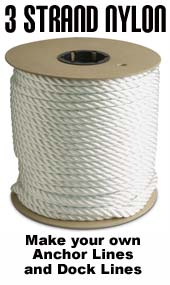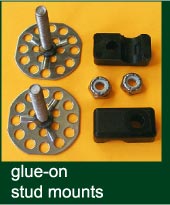
 Custom Search
|
|
| sails |
| plans |
| epoxy |
| rope/line |
| hardware |
| canoe/Kayak |
| sailmaking |
| materials |
| models |
| media |
| tools |
| gear |
 |
 |
| join |
| home |
| indexes |
| classifieds |
| calendar |
| archives |
| about |
| links |
| Join Duckworks Get free newsletter Comment on articles CLICK HERE |
|
|
| Small Boat Stoves - Part One |
by Bill Nolen - Oklahoma City - USA |
| Part one - Part Two - Part Three IntroductionOne of the great enjoyments of owning a small sailboat is sitting in the cockpit in the early morning hours, drinking a hot cup of coffee or tea, and watching the world come to life.
To do this a person needs some method to heat the water! I will attempt to show a few of the many cooking stoves that are suitable (or not suitable?) for use on small sailboats. If your favorite stove is not included, and you believe it should be, please let me know in the comments below and we will attempt to add it. There are dozens and dozens of small stoves that will work quite well on a small boat. Propane cartridges fuel some of these stoves, while there are also solid-fuel stoves, alcohol-fuel stoves, and even solar-fueled stoves! Prices for a stove ranged from $3.50 for a solid fuel tablet stove to over a $100.00 for a propane cartridge stove. One feature that is disturbing about some small stoves is that there is not an easy method of holding a pot on the burner if your sailboat is moving with the waves. However, Travis Votaw, owner of Princess 22 Pilgrim has modified his stove to make it much safer. Here are some of my thoughts and the thoughts of more knowledgeable sailors, and also a few tests of different type of cooking stoves. Different types of boat stoves sorted by fuel used:
Part one: Alcohol Stoves Tiny Home-Built Stoves: However, I'm sure that a determined person could build a suitable platform and holding device to make one of these types of stoves safe and workable.
While the construction of such a stove can be fun, a person might be much better off (safer?) buying one of the small Trangia Spirit Alcohol Stove shown below in the Commercial Built Alcohol Stove Section. These little commercial made stoves will last for many years with no maintenance. Fuel is available in almost any store.
Different kinds of homemade alcohol stoves. For additional information go to: https://zenstoves.net/Stoves.htm Canned Jelled Type Alcohol (Sterno) Stoves:Almost anyone who has camped has seen or used the folding Sterno style stove that uses the small cans of jelled type alcohol fuel. Simple as can be to use, and while not as lightweight as a sold fuel stove, a can of the jelled alcohol fuel burns much longer than with several solid fuel tablets. As a comparison, one solid fuel tablet will burn for only about 8-minutes, just long enough to heat one cup of hot water, while two cans of Sterno type fuel provided enough to heat water for John Wright to brew about 25 cups of coffee and several mugs of soup during the 2009 Texas 200 Event. A can of fuel will cost about $4.00. John Wright uses a 18 oz porcelain covered metal cup (found in Wal-Mart camping supplies) with his old Sterno folding stove to heat water for coffee and to warm soup.
The Sterno type fuel cans are fairly safe to use on a boat because the alcohol is in a jelled type state and less prone to spill. However, ALL ALCOHOL STOVES can be dangerous to use because the burning flames are very difficult to see in brightly lighted areas!
Commercial Built Alcohol Stoves: One of the better lower priced commercially built alcohol stoves is the Swedish made Trangia Stoves. The 25 series stove systems have two saucepans (1.75 and 1.5 liters), an 8-1/2" (22 cm) frying pan, windshields (upper and lower), a burner, a pan grip and a strap. Dimensions are about 8-1/2" x 4" (22 cm x 10,5 cm). It's a little costly at about $70.00 but can be found on sale for less.
These are high quality made stoves that should last years. Once, when camping near Yellowstone, I watched a young German lady cook and serve a three-course dinner using a Trangia Stove in a very short period of time. I was very impressed because I was eating a can of barely warmed Denny Moore Stew! As previously stated, Alcohol Fuel that can be burned in these stoves can be purchased almost anywhere. The higher the content of alcohol the better the fuel burns in one of the stoves. They will burn Denatured Alcohol, Grain Alcohol, Methyl Alcohol (Heet) and Isotropy Rubbing Alcohol. There are also many Trangia style alcohol stoves available in Army Surplus Stores or via Ebay, Most are Swedish or Swiss stoves, but most if not all will have the brass Trangia Spirit Burner. Bill Wickett, owner of a Montgomery 17, wrote "Alcohol may be a bit slower than other compressed gases, but who is in a hurry? Maybe takes another minute or two to boil a kettle of water." "The Trangia Series 25 kit with integral pots, kettle and the wind screen has worked very well for us over the last 4 years on board and ashore. It is a camping stove, so cannot be mounted on a bulkhead etc. Stows very compactly."
"I have also used the two pots, separated by 3 nuts as an oven to bake a blueberry cake up while on the east side of Georgian Bay".
There are several marine high quality SS Alcohol stoves available at Marine Supply Dealers. The Origo and CookMate brands are available and cost between $170 and $200 for a one-burner stove.
CookMate Origo Some additional comments: I've dinghy camped for a few years and my stove of choice is also the Trangia 25 (nonstick pot version). IMO, it is best small boat stove, if one doesn't intend to cook underway. For one thing, at most you will be dealing with one oz. of fuel if the stove is knocked over. While it's true that an alcohol flame can't be seen in daylight, these stoves have such excellent windshields and stability that it doesn't make much difference. I've used my stove for years in all weather conditions, including bright, sunny days with lots of wind, and have never received a burn. I'm far more comfortable with the Trangia (no pressurized and no moving parts) than with a pressurized gasoline or similar stove. I don't have any experience with the Origo stoves, but I've heard they are inefficient and have no windshield. Again, I never have used the stove inside or while underway. In cool weather, I will often make a vacuum bottle of hot coffee or tea to sip during the day but I either eat a cold lunch or no lunch. I've seen people cook amazing things on camp stoves, but the most I will attempt are scrambled eggs, sausage and hamburgers. By the way, the Trangia nonstick lid, even though it is aluminum, makes a decent frying pan. Also, the little tea kettle is great. I use it constantly. The thing that makes the Trangia so useful for boating is the burner stand and interlocking pot stand/windshield. Some of the 'Pepsi can' stove burners are more efficient than the Trangia burner, but their weak point is always the pot stand/windscreen. Since one doesn't have to shave fractions of an ounce of weight when boating (unlike backpacking), I would encourage people to choose the Trangia. (Quentin Rakestraw) https://www.wwpotterowners.com ***** Here's a list of Bill's previous articles:Harmonica - Part 1 - 2 - 3 - 4 - 5 - 6 - 7 A Simple Anchoring System (The Treasure Chest) Front Tiller (The Treasure Chest) |
 |









 A simple stove made from a tin can and Sterno container. Need protection under can/stove to reduce heat to cabinet surface.
A simple stove made from a tin can and Sterno container. Need protection under can/stove to reduce heat to cabinet surface. Trangla Series 25 Stove System open and Closed.
Trangla Series 25 Stove System open and Closed. One of the lightest Trangia stoves in their Spirit Stove that cost only $12.00 for the burner, and $17.00 for the burner and stand.
One of the lightest Trangia stoves in their Spirit Stove that cost only $12.00 for the burner, and $17.00 for the burner and stand. Spirit Burner Spirit Burner and stand
Spirit Burner Spirit Burner and stand



